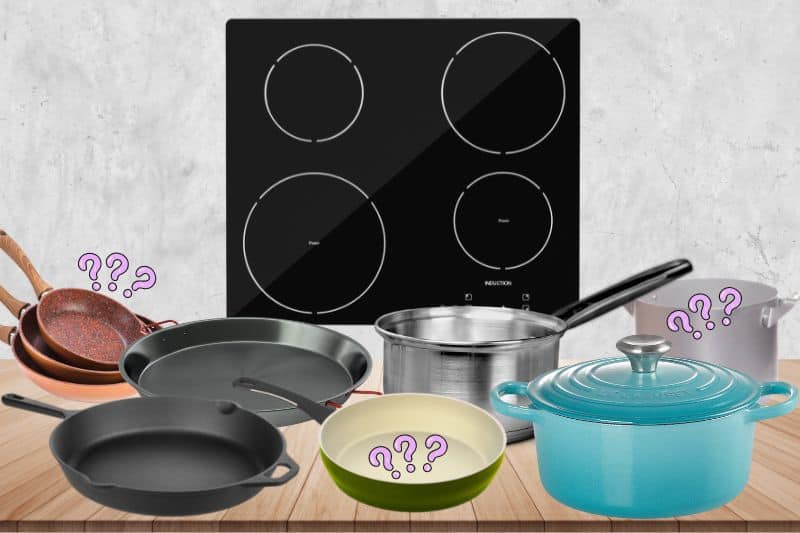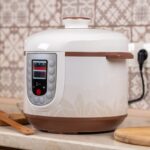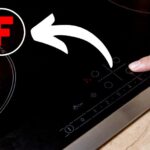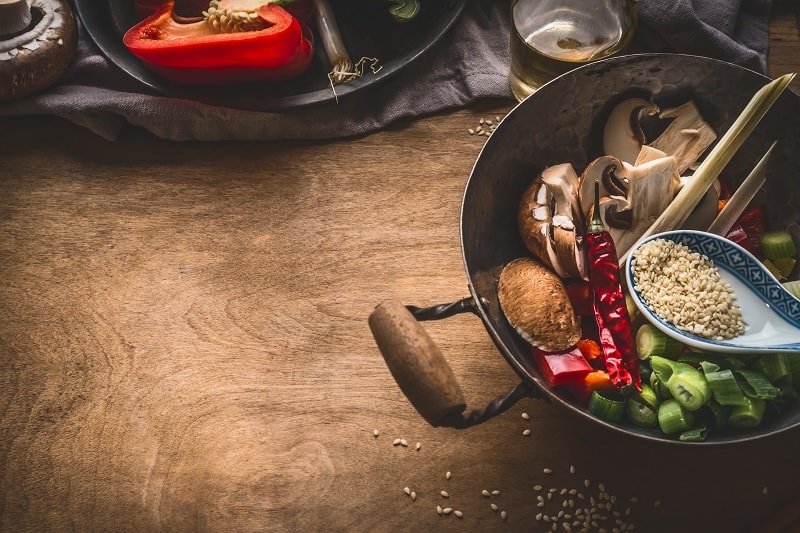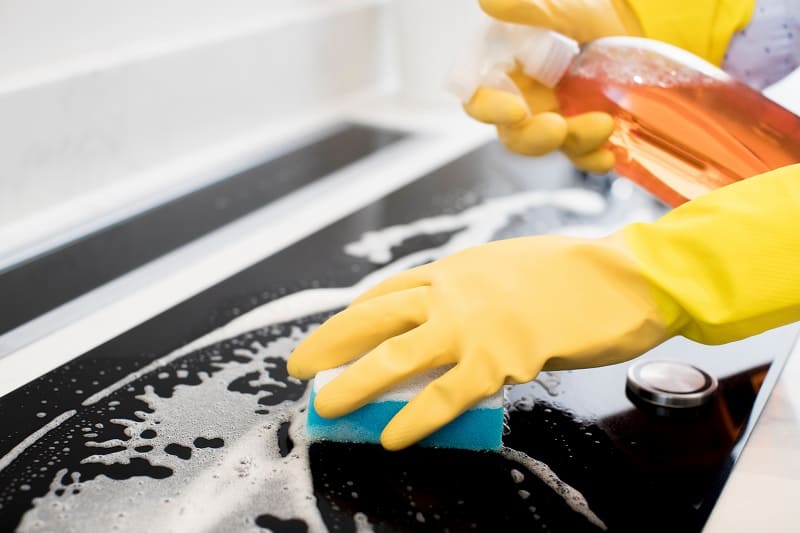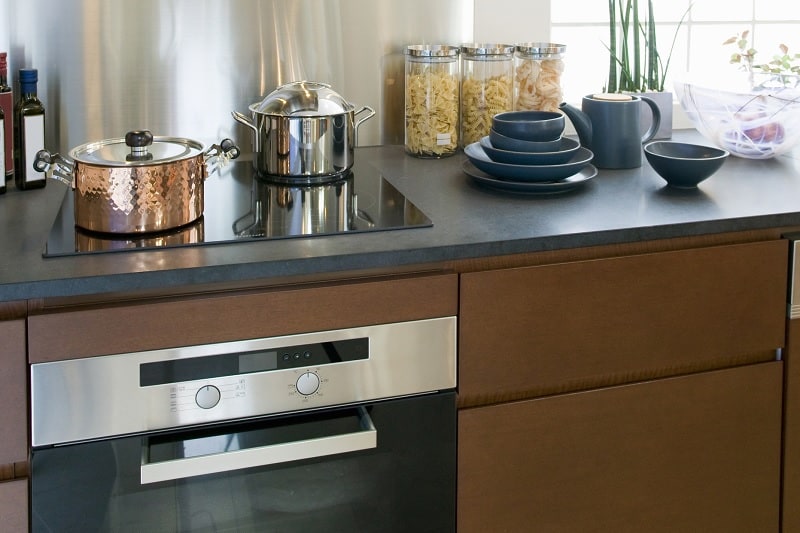Induction cooktops are commonplace in many UK homes. They’re loved for their sleek appearance and energy-efficient cooking.
However, as these hobs work by using an electromagnetic current, you have to be careful about the kinds of pots and pans you use. Some materials can carry this magnetic current and heat effectively, whereas others can’t.
So, what material is best for induction cooking? Here we look at all the types of metal that are compatible with inductions cooktops, which materials you should avoid, and how to tell whether the pans you already own are suitable for induction cooking.
What Metals Can You Use with Induction?
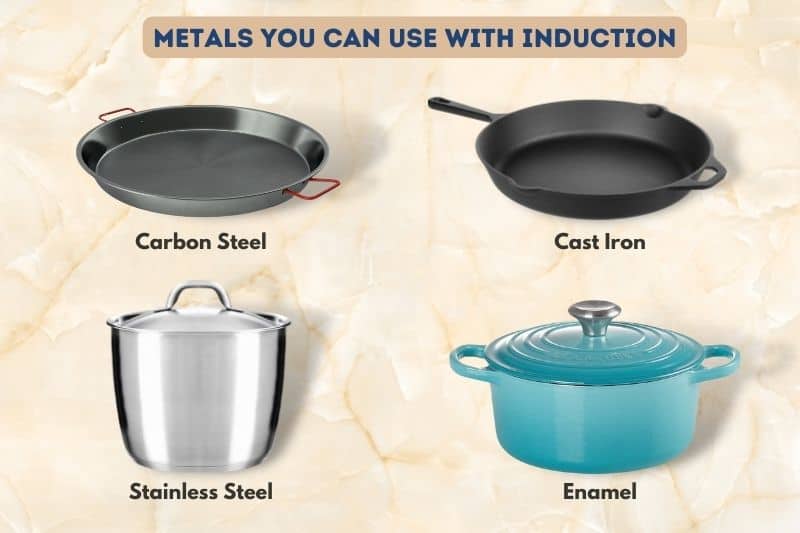
For a pan to work with induction hobs, it needs to be magnetic or “ferrous” (containing iron). This is because only magnetised metals can carry the electromagnetic current produced by the hob rings and heat up.
Thankfully, many quality cookware options are ferrous and work well on your induction stove. Below are some popular examples that might have a place in your kitchen:
- Cast Iron: As the name suggests, cast iron pans are predominantly made from iron with a carbon content of 2% to 3.5%. Iron is one of the most magnetic metals and is commonly used to make magnets, thus any cookware containing this metal is great for induction cooking.
- Stainless Steel: These pans are made from varying combinations of iron, carbon, and chromium. Once again, this cookware contains ferrous iron and therefore works well on all types of induction hobs. However, it needs to be grade 18/10 or more to be compatible.
- Carbon Steel: Carbon steel cookware is also made from iron! These pans actually have a higher percentage of iron than any other type of cookware. They are made mainly from iron with a 1% carbon content, making them fantastic electromagnetic conductors.
- Enamel: Enamel is a form of glass, which means you might assume enamel cookware cannot be used on an induction hob. However, these pots and pans are usually made from cast iron with a thin enamel coating. As such, these too are induction compatible.
What Materials Do Not Work with Induction?
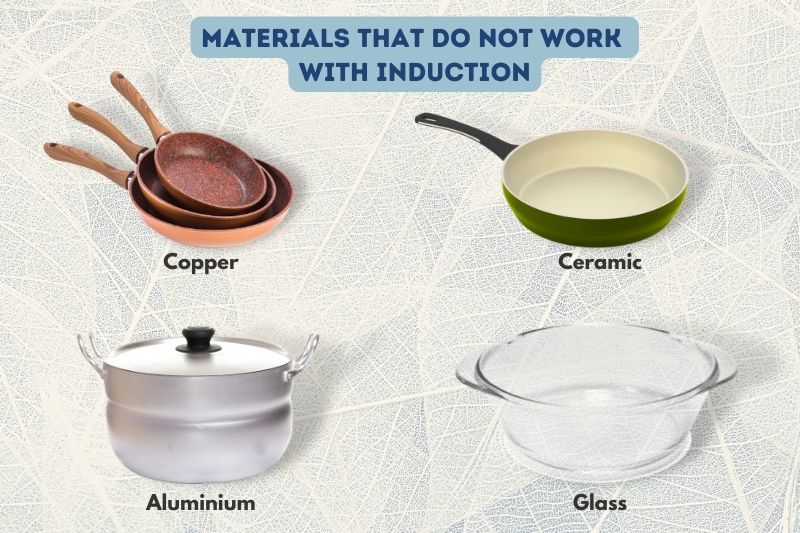
We now know what are the best materials for induction cooking, but are there any metals that need to be avoided? The answer is yes! If you have cookware made from any of the below metals, you’ll need to upgrade your pots and pan when purchasing an induction cooktop:
- Copper: Traditional copper pans are not compatible with induction cooktops as these are made entirely from copper. Copper is a non-ferrous metal and doesn’t have any magnetic properties, so cannot heat from an electro-magnetic current.
- Aluminium: Aluminium is a popular material choice in cookware is it has excellent thermal conductivity, is non-reactive with acidic foods, and heats quickly. However, it is another non-ferrous and unmagnetised metal and so won’t work on induction hobs.
- Ceramic: Ceramic cookware is made out of metal that is coated in a thin layer of ceramic clay, similar to enamel cookware. However, aluminium is usually the metal used for the core. As aluminium is non-magnetic, it is unable to carry a current and heat on an induction hob.
- Glass: Glass pots and pans are a popular choice as they are non-reactive, meaning there are no adverse effects from cooking with glass. However, this cookware also doesn’t work for induction cooking as it has no magnetic properties.
With this said, many pans today made from these metals have an induction plate built into the base. This means that the base of these pans is made from ferrous metal, such as iron.
As the base of the pan is in contact with the induction cooktop, the current can pass and cause the pan to heat.
This means you can still get the benefits of cooking with glass, ceramic, and aluminium, even on induction cooktops.
How To Check if Pans Are Suitable for Induction Cooking
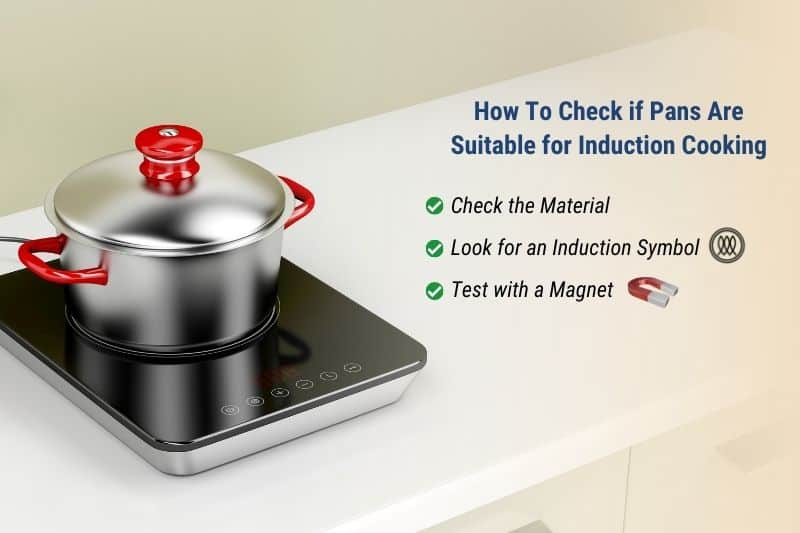
Checking whether or not any cookware you own is compatible with an induction hob is very simple and can be done in three easy steps:
- Check the Material: If you know your pans are made from cast iron, stainless steel, carbon steel, or enamel, they will work in induction. As discussed, these are all predominantly made from iron which is known for its magnetic properties.
- Look for an Induction Symbol: If your pans are made from copper, aluminium, ceramic, or glass, or you don’t know what material they’re made from, you should check the base to look for an induction symbol.
This looks like a coiled spring and is always engraved into the base of the pan. Sometimes, the word “induction” will be written next to the symbol. If this symbol is present, it means the pans work on induction hobs.
- Test with a Magnet: If you cannot see the induction symbol, take a magnet and place it on the base of the pan. Does the magnet stick to the surface? If so, you have a magnetic and thus induction-compatible pan. If not, you’ll need to invest in a new set of pots and pans for your energy-efficient home kitchen.

Hannah is a freelance content writer and self-proclaimed foodie. When Hannah isn’t sitting tapping at her laptop, you’ll probably find her in the kitchen. As an ex-chalet host, she’s used to cooking four-course meals for 10+ people and loves feeding friends and family whenever possible.

